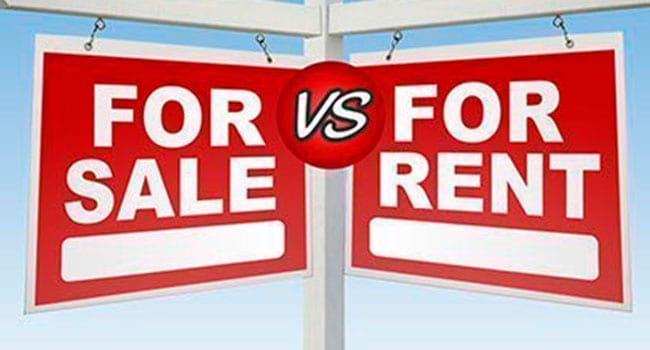 Should I buy a home or rent? It’s a common question but the answer isn’t as simple you may think – it totally depends on your situation, since there are advantages and disadvantages to both.
Should I buy a home or rent? It’s a common question but the answer isn’t as simple you may think – it totally depends on your situation, since there are advantages and disadvantages to both.
It’s usually better to own an asset that’s likely to go up in value than to rent an asset that’s likely to lose value.
However, there are other factors to be considered:
- How long you will own the asset?
- What’s the likelihood it will go up in value?
- Could it go down in value?
- Are there carrying costs involved?
When it comes to owning a home versus renting, you can’t just compare the amount of rent you would pay to the amount of a mortgage payment. There are extra costs associated with owning a home that renters don’t have to deal with. Those include property taxes, property insurance (versus contents-only insurance), condo or association fees, mortgage interest, and maintenance and repair costs. Renters don’t have these expenses and, depending on the province you live in, renters could be protected from rising rents by government-legislated controls. Home owners don’t have any real control over rising costs, such as maintenance, taxes or mortgage rates.
When we look at what our parents or grandparents paid for a home and what a similar home costs today, we’re usually shocked by how much more expensive things are today. But most people fail to consider the annual costs of ownership associated with maintaining that asset over, say, the last 30-plus years. Years of upgrades, maintenance, repairs and taxes add to the carrying cost of ownership that renters don’t have to deal with.
You need to look at all the costs of home ownership and compare them to the cost of renting and investing any savings. If you’re not disciplined enough to invest, then even if it costs more to own a home you might be financially better off to do so, assuming the home goes up in value. Ownership is a forced savings program.
If a renter invested the increased costs that a homeowner must deal with over time, that renter would have a very large investment portfolio. It could easily be greater than the home owner’s equity. However, human nature suggests many people aren’t disciplined enough to invest on a regular basis – or there’s simply too much month left at the end of the money.
While home prices typically increase in value over the long term, there have been shorter periods where home values have dropped. And real estate can be a very difficult investment to convert to cash.
So if you’re not sure that you’re in it for the long term, it’s usually a safer bet to rent.
If you’re moving to a new area, you may want to rent until you decide that you enjoy the region and want to stay.
In a flat or falling real estate market, this can save you thousands of dollars if you’re forced to sell quickly. In a rising market, you could make a tidy profit but in a falling market, you could incur a substantial loss.
Buying a home is often an emotional decision. When this happens, look out. Financial logic and emotions don’t often go together. A home is usually the largest purchase we make and while you should definitely love any home you buy, that shouldn’t be the only reason for your purchase.
Do the math and examine the circumstances to make sure you know what’s in your best long-term interest: buying or renting.
Bill Green is an hourly financial and estate planner, public speaker and author of The Success Tax Shuffle. Bill has over 25 years of experience in the financial services industry.
Bill is a Troy Media Thought Leader. Why aren’t you?
The views, opinions and positions expressed by columnists and contributors are the author’s alone. They do not inherently or expressly reflect the views, opinions and/or positions of our publication.

